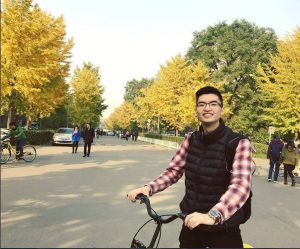Peking University
By Cody Ng, Foster Undergraduate who participated in an exchange with Peking University in Beijing, China
Studying abroad at Peking University was an amazing experience. From the people I met to the food I ate to the places I visited, Beijing—more specifically, Peking University—treated me well. Overall, I wanted to touch upon a few elements of my exchange at Peking University.
I would recommend this exchange program, hands down. But, I do want to point out a few things. Firstly, Chinese is the main and most spoken language in Beijing. While it is possible to study abroad and have fun at Peking University without knowing any Chinese, I would definitely say it helps to understand and be able to speak some. That being said, my classes were taught in English, so lectures were very much the same as the ones in Foster. Knowing and understanding Chinese does  help a lot in terms of finding housing, navigating campus, buying food from the cafeterias, and interacting with local students, so I highly recommend touching upon some basic Chinese if you are considering this exchange program.
help a lot in terms of finding housing, navigating campus, buying food from the cafeterias, and interacting with local students, so I highly recommend touching upon some basic Chinese if you are considering this exchange program.
Peking University’s campus is huge—as big, if not bigger, than the University of Washington. The architecture is definitely a bit more traditional, and buildings are separated based on subject. Bikes are widely used as a method of transportation. At Peking University, there is a wide variety of food choices and many different cafeterias for you to try. Additionally, the food is so, so cheap. I would say that meals ranged from $2 to $3 on average to $8 for a super luxurious meal (outside of Peking University). On campus, you simply go to the cafeterias and order your food; it feels really good knowing how little you spend on your meals!
In terms of student life, there is definitely a wide variety of clubs and activities to join, but I do believe that it is much more difficult for students who don’t speak Chinese fluently to join. For me, I was able to participate in the basketball club, which was a great experience for me to meet other students and try to get to know them outside the classroom. I also joined the Western Student Union, which was great for meeting people of similar background.
The more I write about my experience, though, the more I miss it. So, before I start entering study abroad withdrawals, I will end my story here. I have much more to say and probably missed out on a few key points, so if you have any questions about studying abroad, life in China, my experiences/travels, feel free to reach out to me; I’d be more than happy to share more about my experience.
